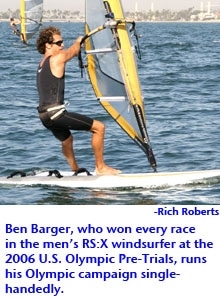
FirstBeatBenBarger
After three weekends of sailing on both coasts, the 2006 U.S. Olympic Pre-Trials wrapped up a week ago in Southern California with RS:X windsurfers racing out of Alamitos Bay YC and 470s racing out of the U.S. Sailing Center-Long Beach.The four groups of sailors competing last weekend-Men’s and Women’s RS:X and Men’s and Women’s 470, which sailed as one fleet for the regatta-had a few things in common. In both fleets, competitors were quite young and short on Olympic experience, often considered a pre-requisite for winning a medal. Only one sailor, 470 crew Isabelle Kinsolving, had competed in an Olympic regatta.In other respects, the two fleets were very different. The U.S. 470 class-which has had a tremendous amount of Olympic success, earning 5 of 8 possible medals since 1992, and 8 of 11 since 1984-has undergone considerable change since the last Trials. Coach Skip Whyte acknowledges his team is raw, but sees plenty of potential in the group. “We’ve gone from sort of the long-tooth class to the short tooth,” says Whyte. The U.S. currently has two strong teams for either sex: Mikee Anderson-Mitterling/David Hughes (9th at 2006 Worlds in Rizhao, China in September) and Stuart McNay/Graham Biehl (17th) and Amanda Clark/Sarah Mergenthaler (11th) and Erin Maxwell/Isabelle Kinsolving (31st).”We have four teams that have more tools in their toolbox than they had a short time ago,” says Whyte, “but they don’t have enough yet. They need to learn how to win and be comfortable in the front of the pack. That puts us in 10th, 12th, something like that. Sometimes a little better, but not top five yet. But well within range.”At the Pre-Trials, McNay and Biehl won handily, scoring less than a third of the points of the second-placed men’s team, Justin Law and Michael Miller. But Anderson-Mitterling missed the first day because of exams at USC. He and Hughes won two races, and finished second or third in three others.The two top women’s teams were very close, separated by just four points after 10 races. Clark and Mergenthaler have sailed together for a number of years; they finished second at the 2003 U.S. Olympic Trials. Maxwell-who finished third in 2003 with Jen Morgan Glass-and Kinsolving are a relatively new team and will improve as they spend more time together.Whyte’s job over the next year is to try to utilize the competition between the two teams to raise everyone’s game. It’s a difficult task as, with less than a year to the Trials, sailors are often reluctant to share too much information with the team they will have to beat to earn an Olympic berth. “We’re striving for a greater degree of cooperation,” says Whyte. “We’ve made some strides.”Whyte says he tries to impress upon these sailors the example set by Jonathan and Charlie McKee, who developed a productive team atmosphere among U.S. 49er sailors prior to their bronze medal in the 2000 Olympics. “They take the bait to different degrees depending on their personalities,” says Whyte.For Ben Barger, the leading U.S. men’s sailor in the RS:X class, it’s a different story. “I run my own program,” says Barger, who finished second to Peter Wells in the 2003 Mistral Trials. “That’s the unique thing we have in the U.S. Each sailor can do it on his own. I raise my money in Tampa, and the city supports me quite well.”The RS:X hasn’t gained much attraction stateside, so for competition Barger must look outside the U.S. He dominated the Pre-Trials, winning each race handily. Seth Besse, who finished second, has posted some good results in Formula competition, but struggles in the lighter air, when the RS:X doesn’t plane as well as the Formula boards.”You wish the sport was larger, higher-participated than it currently is,” says Barger. “That would make my job a lot easier. It makes it so that you train on your own or you bring in training partners. I’ll have some French and Polish sailors come in December and train with them.”Still, Barger says things are better than they were four years ago. He believes the changes implemented by Olympic Sailing Committee chairman Dean Brenner to make the U.S. Sailing Team more competitive on the world scale are being felt in a positive way at the bottom of the team’s priority list. However, he adds, there’s a long way to go for some of the disciplines with slimmer medal prospects.”You can’t reinvent the wheel overnight,” he says. “I think management is better, but there’s some serious work to be done, especially with the classes that don’t get a lot of funding.”In the meantime, Barger does what he can on his own. The RS:X North Americans and the Rolex Miami OCR should bring talent to Florida this winter, enabling Barger to check back in with the world fleet and see where he stands. Then he’ll focus his energy on the ISAF Combined Worlds in Cascais, Portugal, in July 2007, where he hopes to qualify the United States for a berth in the 2008 Olympics, before beginning final preparations for the Trials next fall.









